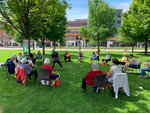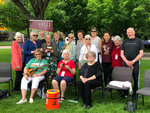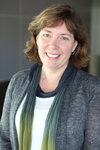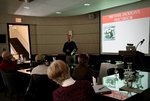



It is widely known that aging is accompanied by varying rates and degrees of cognitive decline. However, neuroscience research has revealed that by keeping physically, socially, and mentally active and engaged, we are able to mitigate, and even reverse decline.
Here in the Twin Cities, we are fortunate to have a resource that offers highly participatory lifelong learning, and solid camaraderie and engagement. Best of all, accessing it is convenient from all corners of our metro area.
The University of Minnesota’s Osher Lifelong Learning Institute, better known as OLLI, is a respected and vital part of the University’s College of Continuing and Professional Studies. Geared toward those over 55, anyone is welcome to join and participate.
Here’s a little history:
In 1977, business executive and philanthropist, Bernard Osher, founded his self-named Bernard Osher Foundation to improve the quality of life through support for higher education and the arts, funding colleges and universities across the nation, with special attention to reentry students. Investing significant funds through generous endowments, the foundation supports 125 lifelong learning programs on university and college campuses across the country, with at least one grantee in each of the 50 states and the District of Columbia. Founded in 1995, UMN’s OLLI has been recognized as an “exemplary lifelong learning program” by the foundation.
Despite the upheavals caused by the pandemic during the past years, OLLI has managed to pivot and cope. There have been a few changes. The main office recently moved from its former location in the McNamara Alumni Center on UMN’s East Bank to its new home in Coffey Hall on the St. Paul Campus.
Also new is OLLI director, Dr. Kathleen (Kate) Schaefers, who brings a wealth of experience, leadership, vision, and passion to the role. We met virtually with Schaefers, who is a licensed psychologist, leadership coach, and educator, who has served as the AARP-MN Volunteer State President, and is a founding member of the Nexel Collaborative, a higher education consortium of institutions exploring ways to bring older adults back to campus. Schaefers graciously answered our questions:
OLLI has been referred to as a “health club for the aging brain,” with much research dedicated to how intellectual and social enrichment help counteract cognitive decline. What are your thoughts about this as the new, incoming executive director?
Healthy aging is more than physical. It is about staying active and engaged, from a physical, mental, and social perspective. Staying curious, and being open to new learning opportunities, is good for our brains, but also for our well-being as we age.
OLLI offers opportunities to learn and stay mentally sharp, but it’s much more than that. As a learning community, OLLI members develop deep connections with others who share a passion for learning. OLLI members actively participate in discussions, explore shared interests, volunteer their talents, and plan joint travel experiences. The bottom line: When we are part of learning activities that fully engage us, that invite us to actively participate and engage with others, we benefit on all levels.
What attracted you to taking the OLLI position? What do you bring to the table?
I am inspired by people in my life who approached their later years with a sense of curiosity, purpose, generosity, and joy. Every one of them embraced life as learners and teachers, mentors, and novices. They are my role models for living life fully at any age. I find kindred spirits within the OLLI community, and I am honored to play a role in helping this community thrive.
I have spent the last decade of my career focusing on ways to tap the talents of an aging population for the greater good. As an educator, program administrator, researcher, and writer, I centered my efforts on engaged aging, lifelong learning, and building community. Also, I am part of a network of people and organizations that see potential in our aging population.
How have the past years of pandemic and quarantine impacted our OLLI program?
Like everyone, OLLI had to pivot on a dime to convert our programming to virtual. We went from delivering 100% of our programming in person to delivering 100% online. With 60+ courses each term, this was no small task! We needed to train our instructors on how to teach this way, and help our members get comfortable with using Zoom.
We were all so isolated, especially in those early days of the pandemic. For our members, who were in a high-risk group, this was particularly true for them. We had to creatively explore new ways to connect our members. We are proud of how OLLI helped our members during these troubling and lonely times. We were a lifeline for our OLLI community.
During my time as an OLLI instructor there was much discussion that the membership fee, now up to $300/year, is prohibitive for some Minnesota seniors. Is there anything being proposed to help defray the cost and/or to subsidize less well-off citizens?
I’m so glad you asked! OLLI offers scholarships to help defray the costs for people in need, through the Miriam B. Seltzer Scholarship Fund. We welcome applications for this scholarship and will help make OLLI accessible and affordable for all who want to join.
It is also important to look at what you get for that yearly membership fee. With four terms, and 60+ courses offered each term, members have access to a plethora of learning opportunities. Plus, members can join special interest groups and take advantage of other offerings. There is a lot of value that comes with an OLLI membership.
Please tell us a little about yourself: Childhood. School years. Education. Profession. Personal life.
I grew up in a tight knit community on the south side of Chicago. With seven children and a disabled father unable to work, money was scarce. Yet despite those hardships, we thrived, due in large part to the support of our neighbors and community. That early life experience grounded me and taught me the value of being part of a community.
In college, I had two majors: mathematics (because I thought it was practical) and psychology (because I was fascinated with the field). On a whim, I applied to graduate school at the University of Minnesota, and by some miracle was accepted, so that is what brought me to Minnesota. I fell in love with Minnesota, and soon fell in love with my husband, so the rest is history. We have been married 34 years and raised our two daughters here.
I’m trained as a psychologist (my Ph.D. is in counseling psychology), with much of my career in higher education: developing curriculum, launching programs, and coaching employees as they navigate leadership and career transitions. I have expertise in encore careers and the intergenerational workplace.
My career isn’t a straight line, and I’m grateful for that. I have made career choices along the way that have taken me in directions I could not have anticipated earlier in my career. I followed my heart and instincts at times, and it opened a world of opportunities.
As OLLI enters its spring session, what would you like our readership to know that we haven’t covered?
OLLI offers something for everyone – we have courses in the arts, science and technology, social sciences, and interdisciplinary fields. From Art of Ancient Greece to The Stories Hidden in Our Genes, we offer a range of options each term (you can find our full OLLI Course Guide on our website). Our courses are taught by an outstanding cadre of instructors who bring topics to life for OLLI learners.
The OLLI community is welcoming! We have special interest groups that allow members to connect around their passions, like movie appreciation, sharing music or games, or even memoir writing. There are ample opportunities to meet people and develop new friendships through OLLI.
You can join OLLI at any time. We host four terms per year, with the spring 2022 term beginning on March 21. Our website is https://ccaps.umn.edu/olli
Author’s Note: Classes and events always have been held throughout the metro area, but due to COVID-19 protocols most offerings are now online. With spring 2022 courses just beginning, there’s no better time to feed our hungry brains.
Happy learning!
Comments
No comments on this item Please log in to comment by clicking here